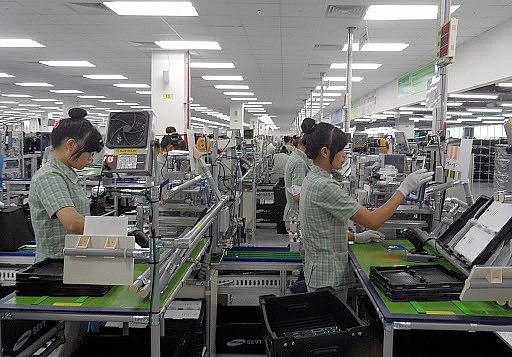
A factory belonging to a foreign company. A new wave of foreign direct investment is forecast in Việt Nam due to a variety of reasons. — Photo tapchitaichinh.vn
HCM CITY — A new wave of foreign direct investment driven by global uncertainty such as the US-China trade war and the COVID-19 pandemic is imminent in Việt Nam, and it will have a much bigger impact on the economy than previous FDI inflows, according to investment fund VinaCapital.
Don Lam, the fund’s co-founder and CEO, said FDI inflows into Việt Nam has been extraordinarily high compared to regional peers in the last few years. Last year it topped US$38 billion, up 7 per cent from 2018.
Most of it was in manufacturing with foreign companies attracted by Việt Nam’s high-quality, low-wage workforce – factory wages are around a third of China’s – and its proximity to China and the rest of Asian garment, furniture, electronics, and other supply chains, he said.
His fund expects the next wave of FDI to be driven by companies relocating their factories out of China and have a bigger impact on Việt Nam’s economy than previous inflows because multinational companies now have an incentive to help local firms “move up the value chain” to build supply chains in Việt Nam capable of supporting those FDI companies.
Việt Nam's FDI inflows would accelerate despite de-globalisation, it said.
The world has been slowly de-globalising since the financial crisis of 2008.
“The COVID crisis exposed serious weaknesses in many supply chains and the WTO predicts that the pandemic will result in a 30 per cent fall in global FDI flows,” Lam said.
“Part of that is related to politicians in some countries who want to bring manufacturing jobs back home, a sentiment that has grown during the outbreak.
“We don’t believe it will slow FDI into Việt Nam at all. In fact, we and others believe it is set to increase.
“Furthermore, we believe that the ability of the US/European companies to repatriate manufacturing activity is limited, and that Việt Nam is still an extremely attractive destination for FDI, which helps explain why we expect Việt Nam’s FDI inflows to accelerate and not decline in coming years.”
Another factor that supports the idea that more FDI will flow into Việt Nam is the country’s effective management of the pandemic.
The government’s decisive action to control the virus has earned praise from international organisations, public health experts and news media.
The Economist magazine too opined that foreign companies would keep in mind how countries responded to Covid-19 when deciding where to locate a factory.
Funnel approach to FDI
To immediately eliminate many countries from consideration while deciding where to invest, decision makers use a “funnel” approach that disqualifies countries based on increasingly stringent factors.
The disqualifying factors include criteria such as political instability, very poor physical infrastructure, and/or unnavigable geographic terrain, lack of factory workers and line managers, and high labour costs.
At the narrowest section of the decision-making funnel are criteria such as the reliability of the country’s electricity supply and logistics. These are lower down in the pecking order because multinationals can work around such impediments, if needed.
“Việt Nam easily passes all the usual filtering criteria, and that is one reason why Việt Nam appears on most multinationals’ shortlist of countries for locating a new factory,” Lam said.
Another ranking scheme used by companies is the Global Supply Chain Readiness Index.
This was developed to help managers of global supply chain assess the strengths, weaknesses, opportunities, and threats of various countries by evaluating individual facts relating to the economy, politics, infrastructure and competence.
This currently ranks Việt Nam ahead of Indonesia, the Philippines and Thailand, but below Malaysia.
It does not lay emphasis on low wages but on the size and attractiveness of the domestic market.
With a 100 million population and growing middle class, Việt Nam is considered an attractive market and so a number of companies invested in Việt Nam even before the pandemic outbreak.
One example of the next wave of investment is Apple and its contractors like GoerTek and Foxconn recently beginning to produce more items in Việt Nam.
(Source: VNS)